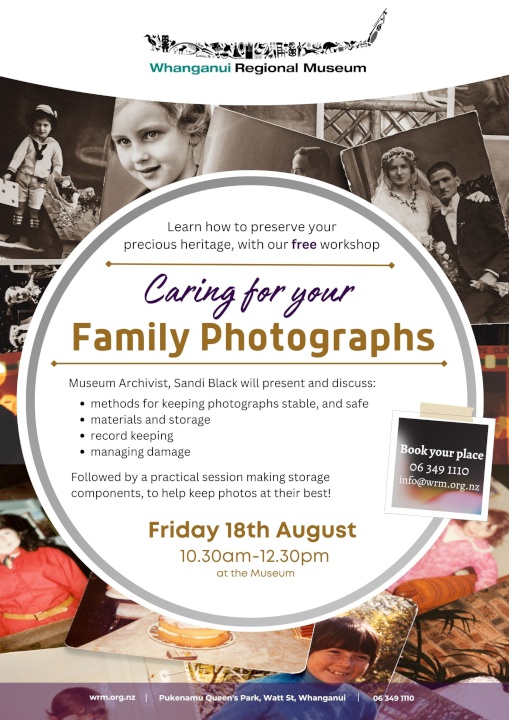Photo Preservation Workshop At Museum
By Karen Hughes
The Whanganui Regional Museum is offering a workshop to help people preserve their precious family photographs.

Museum Archivist, Sandi Black, will facilitate the workshop ‘Caring For Your Family Photographs’, providing hints and tips on how to take the best care of photographic collections at home.
“We’ve got some wonderful photos in the collections but also some that have had damage or are a bit worn or torn, or the mats have cracked, so in the workshop we’ll be looking at these examples, and at how we can stabilise photos and prevent further damage, if people have similar items in their own collections at home.”
Sandi says one of the most important aspects of care is how photographs at home are stored. “The popular magnetic albums – the ones with sticky pages and cellophane over the top - are very bad for photographs. Over time, the glue really sticks, and then if people decide that they want to take the photos out, they can de-laminate in the process, so the print side separates from the back of the photo which is still stuck in the album. The glue can also discolour the photograph, and the materials used in those albums are often acidic.”
“Generally, at the Museum, we put items in Photographic Activity Tested (PAT) envelopes. They are specifically designed to not interact with any of the chemicals used in photography, and that’s how we store most of our collection. Some special items need to be treated with a bit more care, but for most photos at home, there are good alternative materials that aren’t museum-quality but are quite adequate.”
Sandi says the workshop is not about restoring old photos, but about preserving them. “Restoration work is a very scientific process with a great deal of training required. We’ll be looking at safe storage, and basic repair and care.”
Participants in the workshop will be able to get hands-on with some practical learning and make storage components to help keep photographs at their best.
“Older photos are easier to manage because of the materials that were used. The latter 20th-century materials pose a few more problems. The more modern photos are a little bit trickier to deal with because they are a very waxy, plastic sort of paper and that is harder to fix. But if it is ripped or torn, we can stabilise it with specialised tape and recommend encapsulating it with a PAT envelope or we can make a mylar sleeve for it.”
“We’ll also be looking at how to manage a family collection, and the recording of information either on the photographs themselves, or in a book or even a database. The preservation of the information is as important as the physical item.”
The free learning workshop is part of an ongoing schedule of public programmes at the Museum linked to the exhibition Between skin & shirt: The photographic portraits of William Harding. Upcoming events in September will include photography-themed talks in the Museum’s annual Spring Lecture series.
The photograph preservation workshop takes place in the Museum from 10.30am until 12.30pm, on Friday 18th August. Admission to the workshop is free, though koha for the Museum is always appreciated. Bookings are essential: Phone 06 349 1110 or email info@wrm.org.nz.
Founded in 1892, the Whanganui Regional Museum is internationally renowned for its Taonga Māori Collection. Located in Pukenamu Queen’s Park, visitors can view the exceptional creations of tupuna (ancestors) of Whanganui tangata whenua (indigenous people) alongside a changing exhibition programme encompassing a world-class collection of natural and human history, with a regional emphasis. The ground level boutique museum store sells a range of local and Māori jewellery, books, cards, art, and other New Zealand-made gift items.
The Whanganui Regional Museum Trust is an independent legal entity that owns the collection and governs the development of the Museum on behalf of the Whanganui community.
Open to visitors daily from 10.00am to 4.30pm (except Christmas Day and Good Friday), entry to Whanganui Regional Museum is free.
Connect with Whanganui Regional Museum at
www.wrm.org.nz
or on Facebook, Instagram and Twitter.


 National Youth Theatre: 140 Christchurch Kids Shine In National Youth Theatre’s Historic CATS Premiere
National Youth Theatre: 140 Christchurch Kids Shine In National Youth Theatre’s Historic CATS Premiere NZ Symphony Orchestra: NZSO To Tour Masterworks By Mozart, Beethoven, Haydn And More
NZ Symphony Orchestra: NZSO To Tour Masterworks By Mozart, Beethoven, Haydn And More Journal Of Public Health: Vape Shops Cluster Around Schools
Journal Of Public Health: Vape Shops Cluster Around Schools Timaru District Council: Aigantighe Art Gallery Hosts An Iconic Robin White Touring Exhibition
Timaru District Council: Aigantighe Art Gallery Hosts An Iconic Robin White Touring Exhibition Victoria University of Wellington: Dame Winnie Laban Awarded Honorary Doctorate Recognising Achievements For Pasifika
Victoria University of Wellington: Dame Winnie Laban Awarded Honorary Doctorate Recognising Achievements For Pasifika  HESSA: This Isn’t Fair—And It’s Time To Fix It - HESSA Petition Calls For Inclusive Student Sports
HESSA: This Isn’t Fair—And It’s Time To Fix It - HESSA Petition Calls For Inclusive Student Sports